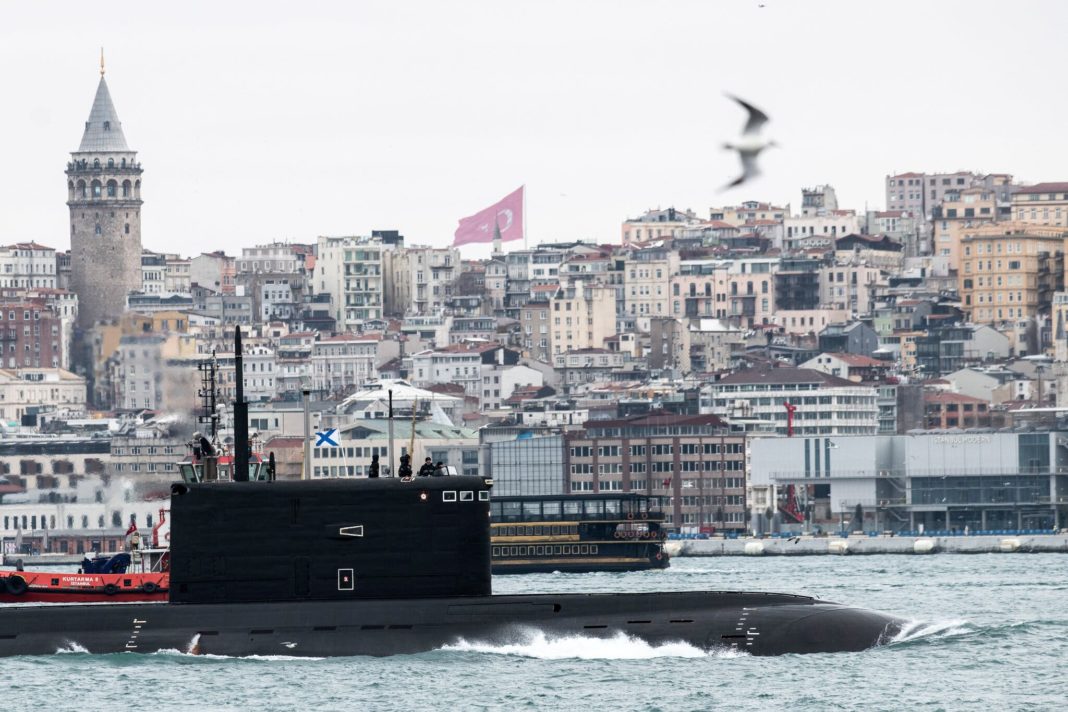Turkey steps up Black Sea naval activity as war rages in Ukraine
« As war rages in Ukraine, to the south Turkey has been busy extending its grip in the Black Sea, stepping up exploration of natural gas resources and holding naval exercises » reports Andrew Wilks in Al-Monitor.
Earlier this month, Ankara dispatched the last of its three drilling ships — the Fatih, Kanuni and Yavuz — to the Sakarya gas field, which lies 185 kilometers (115 miles) north of the port of Zonguldak.
The deployment is the latest stage in Turkey’s bid to harness 540 billion cubic meters of gas discovered two years ago, potentially loosening its reliance on gas from Russia.
President Recep Tayyip Erdogan oversaw the final day of the Mavi Vatan, or Blue Homeland, exercise in the Mediterranean, Aegean and Black seas. The naval maneuvers saw 122 surface ships, 41 aircraft and 12,000 personnel take part in coordinated operations over 10 days.
In a televised address to mark the conclusion of the war games, Erdogan stressed the need for Turkey to protect the seas that border it to the north, west and south by maintaining a modern navy.
“We will continue these efforts decisively until we become the most powerful naval force in the region and the world,” he said.
The Black Sea — once dubbed the Ottoman Lake due to Turkish supremacy — has an important place in the country’s psyche. Turkey’s ownership of the Bosporus under the 1936 Montreaux Convention gives it control over passage between the Mediterranean and Black seas.
During the Cold War, however, the Soviet Union became the dominant power through its control of the sea’s northern and eastern coastlines, with Warsaw Pact members Romania and Bulgaria to the west.
“In the two decades following the Cold War, Russia experienced a reversal of its fortunes in the Black Sea region, as Bulgaria and Romania joined NATO,” said Paul Stronski, senior fellow in Carnegie’s Russia and Eurasia Program.
“Georgia and Ukraine also declared their intent to join the alliance — all of which risked shifting the regional balance in NATO’s favor.”
As differences between the two countries were accentuated by the Syrian conflict, Erdogan in 2016 lamented that the sea had “almost become a Russian lake” and called for a greater NATO presence.
According to Emil Avdaliani, who teaches history and international relations at Tbilisi State University, Turkey’s policy in the Black Sea region has been in a state of “flux” since Russia’s 2008 invasion of Georgia.
Followed by the annexation of Crimea in 2014, the posting of Russian peacekeeping troops to Nagorno-Karabakh two years ago and the current war in Ukraine, Turkey increasingly sees its role in the region as balancing its foreign policy in the face of Moscow’s ambitions.
“But over time it has become increasingly difficult to maintain this equilibrium,” Avdaliani said. “Russia has doubled its military pressure on the wider Black Sea region. Since this geographic area has served as a buffer zone for Turkey against its historic rival, this leaves little chance for Turkey to successfully maintain the balance it has so far pursued.”
Perhaps more significant than Ankara’s flexing of its military muscles is the discovery of natural gas in its exclusive economic zone.
Turkey is fully dependent on gas imports, mainly piped from Russia but also from Azerbaijan and Iran. Last year it imported a record 60.1 billion cubic meters, with Russia supplying 45%, nearly three times more than any other supplier.
The Sakarya field is expected to reduce those imports by about a quarter once it reaches peak production in the next five years. Ankara plans to begin pumping gas from the field next year but must first build an offshore pipeline network and processing facilities.
“With our discovery of 540 bcm of natural gas, which will change Turkey’s destiny, we have taken an important step toward Turkey’s energy independence,” Energy Minister Fatih Donmez said earlier this month as he oversaw the departure of the Yavuz drillship.
The first phase of pipeline is due to be completed in November, the state-run Anadolu news agency reported on Monday.
In backing the $9.9 billion project to develop the natural gas field, the government announced tax exemptions Wednesday for the Turkish Petroleum Corporation.
Al-Monitor, April 21, 2022, Andrew Wilks, Photo/Burak Kara/Getty Images

